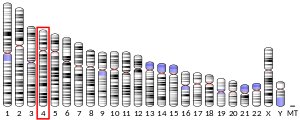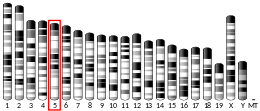LETM1
Leucine zipper-EF-hand containing transmembrane protein 1 is a protein that in humans is encoded by the LETM1 gene.[5]
Structure
The LETM1 protein has a transmembrane domain and a casein kinase 2 and protein kinase C phosphorylation site.[6] The LETM1 gene is expressed in the mitochondria of many eukaryotes indicating that this is a conserved mitochondrial protein.[7]
Function
LETM1 is a eukaryotic protein that is expressed in the inner membrane of mitochondria. Experiments performed with human cells have been interpreted to indicate that it functions as a component of a Ca2+/H+ antiporter.[8] Experimental results with yeast cells have been interpreted as suggesting that LETM1 functions as a component of a K+/H+ antiporter.[9] The Drosophila melanogaster LETM1 protein has been shown to functionally substitute for the K+/H+ antiporter function in yeast cells.[10]
Clinical significance
Deletion of LETM1 is thought to be involved in the development of Wolf–Hirschhorn syndrome in humans.[6]
See also
References
- GRCh38: Ensembl release 89: ENSG00000168924 - Ensembl, May 2017
- GRCm38: Ensembl release 89: ENSMUSG00000005299 - Ensembl, May 2017
- "Human PubMed Reference:". National Center for Biotechnology Information, U.S. National Library of Medicine.
- "Mouse PubMed Reference:". National Center for Biotechnology Information, U.S. National Library of Medicine.
- "Entrez Gene: leucine zipper-EF-hand containing transmembrane protein 1".
- Endele S, Fuhry M, Pak SJ, Zabel BU, Winterpacht A (Sep 1999). "LETM1, a novel gene encoding a putative EF-hand Ca(2+)-binding protein, flanks the Wolf-Hirschhorn syndrome (WHS) critical region and is deleted in most WHS patients". Genomics. 60 (2): 218–25. doi:10.1006/geno.1999.5881. PMID 10486213.
- Schlickum S, Moghekar A, Simpson JC, Steglich C, O'Brien RJ, Winterpacht A, Endele SU (Feb 2004). "LETM1, a gene deleted in Wolf-Hirschhorn syndrome, encodes an evolutionarily conserved mitochondrial protein". Genomics. 83 (2): 254–61. doi:10.1016/j.ygeno.2003.08.013. PMID 14706454.
- Waldeck-Weiermair M, Jean-Quartier C, Rost R, Khan MJ, Vishnu N, Bondarenko AI, Imamura H, Malli R, Graier WF (Aug 2011). "Leucine zipper EF hand-containing transmembrane protein 1 (Letm1) and uncoupling proteins 2 and 3 (UCP2/3) contribute to two distinct mitochondrial Ca2+ uptake pathways". The Journal of Biological Chemistry. 286 (32): 28444–55. doi:10.1074/jbc.M111.244517. PMC 3151087. PMID 21613221.
- Zotova L, Aleschko M, Sponder G, Baumgartner R, Reipert S, Prinz M, Schweyen RJ, Nowikovsky K (May 2010). "Novel components of an active mitochondrial K(+)/H(+) exchange". The Journal of Biological Chemistry. 285 (19): 14399–414. doi:10.1074/jbc.M109.059956. PMC 2863244. PMID 20197279.
- McQuibban AG, Joza N, Megighian A, Scorzeto M, Zanini D, Reipert S, Richter C, Schweyen RJ, Nowikovsky K (Mar 2010). "A Drosophila mutant of LETM1, a candidate gene for seizures in Wolf-Hirschhorn syndrome". Human Molecular Genetics. 19 (6): 987–1000. doi:10.1093/hmg/ddp563. PMID 20026556.
Further reading
- Piao L, Li Y, Kim SJ, Byun HS, Huang SM, Hwang SK, Yang KJ, Park KA, Won M, Hong J, Hur GM, Seok JH, Shong M, Cho MH, Brazil DP, Hemmings BA, Park J (Apr 2009). "Association of LETM1 and MRPL36 contributes to the regulation of mitochondrial ATP production and necrotic cell death". Cancer Research. 69 (8): 3397–404. doi:10.1158/0008-5472.CAN-08-3235. PMID 19318571.
- Endele S, Fuhry M, Pak SJ, Zabel BU, Winterpacht A (Sep 1999). "LETM1, a novel gene encoding a putative EF-hand Ca(2+)-binding protein, flanks the Wolf-Hirschhorn syndrome (WHS) critical region and is deleted in most WHS patients". Genomics. 60 (2): 218–25. doi:10.1006/geno.1999.5881. PMID 10486213.
- Nowikovsky K, Froschauer EM, Zsurka G, Samaj J, Reipert S, Kolisek M, Wiesenberger G, Schweyen RJ (Jul 2004). "The LETM1/YOL027 gene family encodes a factor of the mitochondrial K+ homeostasis with a potential role in the Wolf-Hirschhorn syndrome". The Journal of Biological Chemistry. 279 (29): 30307–15. doi:10.1074/jbc.M403607200. PMID 15138253.
- Tamai S, Iida H, Yokota S, Sayano T, Kiguchiya S, Ishihara N, Hayashi J, Mihara K, Oka T (Aug 2008). "Characterization of the mitochondrial protein LETM1, which maintains the mitochondrial tubular shapes and interacts with the AAA-ATPase BCS1L". Journal of Cell Science. 121 (Pt 15): 2588–600. doi:10.1242/jcs.026625. PMID 18628306.
- Piao L, Li Y, Kim SJ, Sohn KC, Yang KJ, Park KA, Byun HS, Won M, Hong J, Hur GM, Seok JH, Shong M, Sack R, Brazil DP, Hemmings BA, Park J (May 2009). "Regulation of OPA1-mediated mitochondrial fusion by leucine zipper/EF-hand-containing transmembrane protein-1 plays a role in apoptosis". Cellular Signalling. 21 (5): 767–77. doi:10.1016/j.cellsig.2009.01.020. PMID 19168126.
- Jiang D, Zhao L, Clapham DE (Oct 2009). "Genome-wide RNAi screen identifies Letm1 as a mitochondrial Ca2+/H+ antiporter". Science. 326 (5949): 144–7. doi:10.1126/science.1175145. PMC 4067766. PMID 19797662.
- Hwang SK, Piao L, Lim HT, Minai-Tehrani A, Yu KN, Ha YC, Chae CH, Lee KH, Beck GR, Park J, Cho MH (2010). "Suppression of lung tumorigenesis by leucine zipper/EF hand-containing transmembrane-1". PLOS ONE. 5 (9). doi:10.1371/journal.pone.0012535. PMC 2932724. PMID 20824095.
- Dimmer KS, Navoni F, Casarin A, Trevisson E, Endele S, Winterpacht A, Salviati L, Scorrano L (Jan 2008). "LETM1, deleted in Wolf-Hirschhorn syndrome is required for normal mitochondrial morphology and cellular viability". Human Molecular Genetics. 17 (2): 201–14. doi:10.1093/hmg/ddm297. PMID 17925330.
- Gevaert K, Goethals M, Martens L, Van Damme J, Staes A, Thomas GR, Vandekerckhove J (May 2003). "Exploring proteomes and analyzing protein processing by mass spectrometric identification of sorted N-terminal peptides". Nature Biotechnology. 21 (5): 566–9. doi:10.1038/nbt810. PMID 12665801.
- Hasegawa A, van der Bliek AM (Sep 2007). "Inverse correlation between expression of the Wolfs Hirschhorn candidate gene Letm1 and mitochondrial volume in C. elegans and in mammalian cells". Human Molecular Genetics. 16 (17): 2061–71. doi:10.1093/hmg/ddm154. PMID 17606466.
- Hendrickson SL, Lautenberger JA, Chinn LW, Malasky M, Sezgin E, Kingsley LA, Goedert JJ, Kirk GD, Gomperts ED, Buchbinder SP, Troyer JL, O'Brien SJ (2010). "Genetic variants in nuclear-encoded mitochondrial genes influence AIDS progression". PLOS ONE. 5 (9): e12862. doi:10.1371/journal.pone.0012862. PMC 2943476. PMID 20877624.
- Schlickum S, Moghekar A, Simpson JC, Steglich C, O'Brien RJ, Winterpacht A, Endele SU (Feb 2004). "LETM1, a gene deleted in Wolf-Hirschhorn syndrome, encodes an evolutionarily conserved mitochondrial protein". Genomics. 83 (2): 254–61. doi:10.1016/j.ygeno.2003.08.013. PMID 14706454.
- Barbe L, Lundberg E, Oksvold P, Stenius A, Lewin E, Björling E, Asplund A, Pontén F, Brismar H, Uhlén M, Andersson-Svahn H (Mar 2008). "Toward a confocal subcellular atlas of the human proteome". Molecular & Cellular Proteomics. 7 (3): 499–508. doi:10.1074/mcp.M700325-MCP200. PMID 18029348.
This article incorporates text from the United States National Library of Medicine, which is in the public domain.



